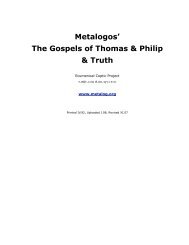Andrew Louth - Syriac Christian Church
Andrew Louth - Syriac Christian Church
Andrew Louth - Syriac Christian Church
Create successful ePaper yourself
Turn your PDF publications into a flip-book with our unique Google optimized e-Paper software.
DIFFICULTY 10<br />
INTRODUCTION<br />
This is much the longest Difficulty in the earlier collection. It<br />
proceeds, by way of a discussion of a passage from St Gregory<br />
Nazianzen’s Sermon 21, a panegyric of St Athanasius, the Patriarch<br />
of Alexandria and defender of Nicene orthodoxy, who died in 373, to<br />
constitute one of the most wide-ranging discussions of Maximus’<br />
theological ideas. Because of its wide scope, it gives us a glimpse of the<br />
kind of things Bishop John of Cyzicus and Maximus discussed among<br />
themselves— interpretations of scriptural passages, problems raised<br />
by the ideas current among the Origenist monks, and a whole series<br />
of philosophical ideas, mainly concerned with the constitution of the<br />
human person and meaning of God’s providence—all of this bearing on<br />
their deepest concern, love and knowledge of God and union with him<br />
in a transforming vision.<br />
Because of its length, we get a glimpse, too, of how Maximus’ mind<br />
worked. The movement of his mind is that of one who ponders and<br />
meditates, patiently drawing together all sorts of apparently diverse<br />
concerns. It is what is sometimes called ‘lateral thinking’, i.e. his mind<br />
does not move straight ahead in conformity to a linear, logical<br />
argument, rather it moves sideways, and gathers together a collection<br />
of considerations that are gradually made to converge.<br />
Maximus’ concern in this difficulty is primarily with the danger<br />
that the passage from Gregory might be misinterpreted to sanction<br />
the notion that the mind can reach God through reason alone, without<br />
the necessity of any engagement in ascetic struggle, or praktikê. How<br />
this might relate to the Origenism of Maximus’ day has been<br />
discussed above. 1 Maximus starts by rejecting this idea directly, and<br />
finds in the text of Gregory support for his insistence on the essential<br />
importance of ascetic struggle. He finds this support in Gregory’s<br />
describing the ‘fleshly’ as a ‘cloud or veil’. For the imagery of cloud or




